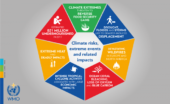Re Ian Bremmer 'Could third-party candidates upend the 2024 US election?' 3 April The current political movement in the USA…
Greener by miles – locally-sourced food debate: Comment
Written by Diana Thebaud Nicholson // June 3, 2007 // Agriculture & Food, Climate Change, Sustainable Development, Wednesday Nights // Comments Off on Greener by miles – locally-sourced food debate: Comment
A contribution from Douglas Lightfoot to the on-going debate on climate change
03/06/2007
Conscientious consumers are being urged to buy locally sourced food in the battle against climate change. But, as Richard Gray discovers, produce from the other side of the world can actually have a smaller carbon footprint
Take a look in the average supermarket trolley and the food there will probably have travelled farther than most people clock up in a decade. A selection of just 26 items can have covered a total of 150,000 miles before reaching the British kitchen.
With beef from Brazil, beans from Kenya, apples from New Zealand, chicken from Thailand and strawberries from Spain, shoppers can enjoy year-round produce. But with such astonishing “food miles” being accumulated, it is little surprise that their environmental impact is coming under scrutiny and sparking a backlash.
Already, the major supermarkets are crawling over each other to highlight their “locally sourced” produce, while Marks and Spencer has begun labelling air-freighted products with logos of aircraft. Yet some startling research is emerging that shows food miles might not be as bad as consumers have been led to believe.
Analysis of the industry reveals that for many foods, imported products are responsible for lower carbon dioxide emissions than the same foodstuffs produced in Britain. Even products shipped from the other side of the world emit fewer greenhouse gases than British equivalents.
The reasons are manifold. Sometimes it is because they require less fertiliser; sometimes, as with greenhouse crops, less energy; sometimes, as with much African produce, the farmers use little mechanised equipment. The findings are surprising environmental campaigners, who have, until now, used the distance travelled by food as the measure of how polluting it is complete article



